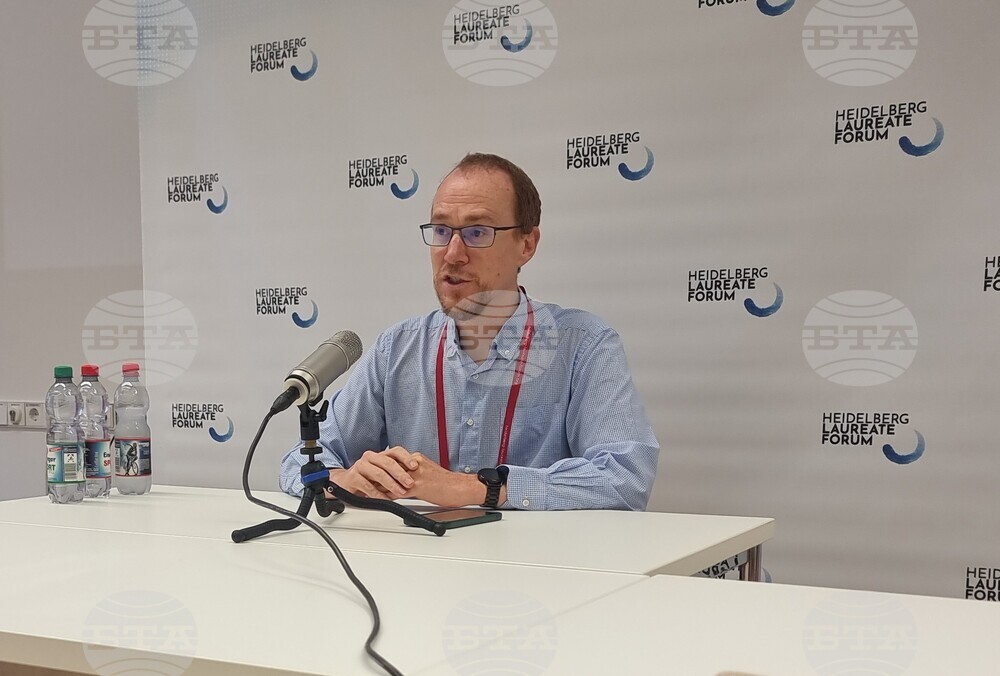site.btaComputer Scientist Torsten Hoefler Calls for Rethinking Education in the Age of AI


We need to rethink education because of artificial intelligence (AI), Torsten Hoefler, winner of the Association for Computing Machinery's 2024 Computer Science Award, told BTA. Hoefler spoke with reporters about competition in supercomputer development, AI, and the place of scientists in society at the 12th edition of the Heidelberg Laureate Forum, which was hosted by Heidelberg University between September 14 and 20.
Asked by BTA about how he would join the public conversation on whether people should fear AI, Hoefler said that he is very optimistic about the future and that, according to his predictions, we can expect several remarkable and exciting years of knowledge. He warned that risks also exist.
Over the past few years, efforts have been focused on growing computational efficiency, and these efforts should continue, so that AI can reach the level of human intelligence. He continued: "But then the question is what does that mean, what happens." He specified that people should come to understand how society will function in the future in the context of numerous jobs no longer being relevant.
Hoefler shared that he participated in a discussion about the history of Argonne National Laboratory in the US, one of the first national laboratories in the US, where large-scale calculations and simulations were carried out in collaboration with the navy. There was a position there called 'computer', which was held by people. Hundreds if not thousands of workers who were tasked with performing calculations and solving equations were called computers. The first US nuclear submarine was largely created by people working as computers. All these people lost their jobs to the modern machine called computer, however, society managed to redirect them, to give them new jobs. The scientist pointed out that while in the past only a small fraction of the workforce was impacted by the invention of computing machines, AI today may affect a much larger population by making their jobs obsolete or requiring significantly fewer workers.
He said: "For example, I am a programmer. I can program now ten times as fast as I could before. [...] Many of the [tasks] I gave my students in the past, I just don't do anymore, because I can ask Gemini, ChatGPT, [GitHub] Copilot, I can ask any of those AIs to do this for me. So you can argue that I need less students to work with me. Now this is an even bigger problem, because I am an educator. How do you become an expert in the field, if you have no apprentice work to do?" He concluded that education should be rethought.
Hoefler spoke about the first mechanical computer took one year to figure out how to make it work, while innovations today are moving at breakneck speeds, so "we have to be careful". He shared: "I am looking very optimistically to the future. I think it's going to be great future. In the end, we have to understand how to live. The next couple of years will for sure be absolutely great for us, because we will all be more productive and move faster. And only then, after a decade or so, we may run into problems because of the middle pipeline – now that we are the experts."
According to Hoefler, Europe can compete on equal terms in the global race to develop supercomputers and AI, if it acts as one entity rather than spreading its capacity across dozens of small projects. In the EU, science is not just about funding but also about the exchange of talent, since both countries benefit from exchanging students and scholars on learning programmes.
When asked which topics in science should be discussed more in the media and in society, Hoefler said that more attention should be paid to scientists rather than celebrities, so that children and young adults dream more often of becoming great scientists instead of popstars.
Torsten Hoefler is a Professor of Computer Science at ETH Zurich where he directs the Scalable Parallel Computing Laboratory. He is the Chief Architect for Machine Learning at the Swiss National Supercomputing Centre. He also works as a consultant on AI for Microsoft. Received his PhD in Computer Science from Indiana University in 2007.
The 12th edition of the Heidelberg Laureate Forum took place at Heidelberg University from September 14 to 20. It brought together 208 early-career mathematicians and computer science researchers from 54 countries to engage in discussions on AI, research ethics, mathematical advancements, and career development with 28 recipients of the world’s most prestigious mathematics and computer science awards.
/NZ/
Additional
news.modal.image.header
news.modal.image.text
news.modal.download.header
news.modal.download.text
news.modal.header
news.modal.text


